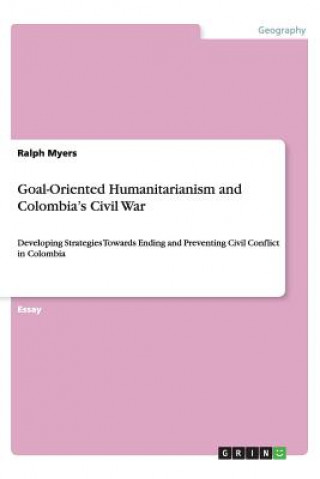
Code: 01687253
Goal-Oriented Humanitarianism and Colombia's Civil War
by Ralph Myers
Essay from the year 2011 in the subject Earth Science / Geography - Geopolitics, grade: 79%, University College Dublin, language: English, abstract: Humanitarian organisations have always realised that their activities have geopol ... more
- Language:
 English
English - Binding: Paperback
- Number of pages: 28
Publisher: Grin Verlag, 2013
- More about this

17.42 €
RRP: 19.35 €
You save 1.93 €

In stock at our supplier
Shipping in 9 - 11 days
You might also like
-

Comprehensive Preventive Dentistry
119.79 € -

Čarodějné pohádky pro malé kouzelníky
13.29 € -25 % -

Pokemon the Movie: Hoopa and the Clash of Ages
8.25 € -28 % -

Lehrbuch der rumänischen Sprache
23.67 € -4 % -

Militärfahrzeuge des deutschen Heeres
12.28 € -9 % -

Fluoride removal in community water supply using natural materials
22.96 € -9 % -

Maschinenintegrierte optische Oberflächenprüfung von gehonten Zylinderlaufbahnen unter Kühlschmierstoff
37.37 € -10 %
Give this book as a present today
- Order book and choose Gift Order.
- We will send you book gift voucher at once. You can give it out to anyone.
- Book will be send to donee, nothing more to care about.
More about Goal-Oriented Humanitarianism and Colombia's Civil War
You get 44 loyalty points
 Book synopsis
Book synopsis
Essay from the year 2011 in the subject Earth Science / Geography - Geopolitics, grade: 79%, University College Dublin, language: English, abstract: Humanitarian organisations have always realised that their activities have geopolitical consequences and that they are inseparably linked to the political world. However, since the 1990 s, humanitarian organisations have increasingly begun acting upon this awareness (Barnett 2005: 724). The watershed for this transformation from minimalist assistance provision to goal-oriented humanitarianism, was the decision of numerous humanitarian organisations to pull out of Rwandan refugee camps in Zaire. The argument was that these camps were being used by Hutu genocidaires to launch violent attacks on Rwandan soil (Fox 2001: 279-280, 285-288). The shift to goal-oriented humanitarianism has resulted in a broad trend towards an increased use of humanitarian assistance as part of a more comprehensive strategy to transform conflicts and decrease the violence (Uvin 1999: 8). This paper identifies three strategies in which humanitarian organisations can address the root causes of conflict in the 21st century: disaster risk reduction (DRR), the decision to withhold or focus aid in specific areas, and speaking out. DRR is usually executed pre-conflict or during periods of reduced violence, whilst the latter two are relevant at the time of conflict.The main aims of this paper are to examine the phenomenon of civil war from a geopolitical perspective and identifying variables linked to both the onset and duration of civil conflict, specifically in the case of Colombia. The conclusions drawn here should assist humanitarian organisations present in Colombia, in identifying ways to implement the above three mentioned strategies so as to address the root causes of civil war. Halting conflict and preventing future reoccurrence of civil war is in the direct interest of Colombian based humanitarian organisations, as many of them work with internally displaced persons (IDPs). As Ibá
 Book details
Book details
17.42 €
- Full title: Goal-Oriented Humanitarianism and Colombia's Civil War
- Subtitle: Developing Strategies Towards Ending and Preventing Civil Conflict in Colombia
- Author: Ralph Myers
- Language:
 English
English - Binding: Paperback
- Number of pages: 28
- EAN: 9783656442370
- ISBN: 3656442371
- ID: 01687253
- Publisher: Grin Verlag
- Weight: 56 g
- Dimensions: 210 × 148 × 2 mm
- Published: 2013
Trending among others
-

The Book of Bill
23.77 € -14 % -

Gravity Falls Journal 3
16.41 € -23 % -

Berserk Deluxe Volume 1
44.42 € -11 % -

Pumpkin Spice Cafe
11.78 € -17 % -

Berserk Deluxe Volume 2
52.28 € -

White Nights
3.52 € -23 % -

It ends with us
8.76 € -18 % -

48 Laws Of Power
18.03 € -29 % -

A Little Life
17.52 € -

Atomic Habits
15.91 € -14 % -

Berserk Deluxe Volume 3
48.86 € -2 % -

Gilmore Girls: The Official Advent Calendar
28.91 € -25 % -

Surrounded by Idiots
10.47 € -29 % -

Jujutsu Kaisen, Vol. 23
9.76 € -26 % -

The 48 Laws of Power
24.57 € -5 % -

The Official Stardew Valley Cookbook
22.36 € -22 % -

Berserk Deluxe Volume 4
45.23 € -10 % -

A Good Girl's Guide to Murder
8.15 € -25 % -

Iron Flame
16.31 € -17 % -

A Curse For True Love
10.37 € -12 % -

Berserk Deluxe Volume 5
50.47 € -

It Starts with Us
8.96 € -16 % -

Twisted Love
9.76 € -24 % -

Powerless
10.47 € -18 % -

Twisted Hate
10.17 € -20 % -

The Husky and His White Cat Shizun: Erha He Ta de Bai Mao Shizun (Novel) Vol. 6
16.21 € -19 % -

Court of Mist and Fury
9.36 € -18 % -

Twisted Lies
9.76 € -24 % -

English File: Intermediate: Student's Book with Online Practice
25.58 € -7 % -

Reckless
10.27 € -20 % -

Psychology of Money
18.93 € -3 % -

Chainsaw Man, Vol. 16
10.77 € -18 % -

Berserk Deluxe Volume 6
51.17 € -

Everything I Know About Love
10.37 € -29 % -

Twisted Games
9.76 € -17 % -

Court of Thorns and Roses Paperback Box Set (5 books)
50.07 € -20 % -

English File Upper Intermediate Student's Book with Student Resource Centre Pack (4th)
36.36 € -6 % -

Gravity Falls: Lost Legends
17.82 € -15 % -

Vagabond (VIZBIG Edition), Vol. 1
24.57 € -

Court of Thorns and Roses
9.26 € -19 % -

Headway: Elementary: Student's Book with Online Practice
24.98 € -7 % -

A Court of Wings and Ruin
10.77 € -6 % -

The Courage To Be Disliked
10.97 € -14 % -

Headway: Elementary: Workbook Without Key
25.58 € -4 % -

A Court of Silver Flames
10.17 € -20 % -

Meow
20.75 € -

Once Upon A Broken Heart
10.67 € -17 % -

SOLO LEVELING V09
17.52 € -12 % -

Fourth Wing
10.27 € -28 %
Collection points Bratislava a 2642 dalších
Copyright ©2008-24 najlacnejsie-knihy.sk All rights reservedPrivacyCookies


 15549 collection points
15549 collection points Delivery 2.99 €
Delivery 2.99 € 02/210 210 99 (8-15.30h)
02/210 210 99 (8-15.30h)